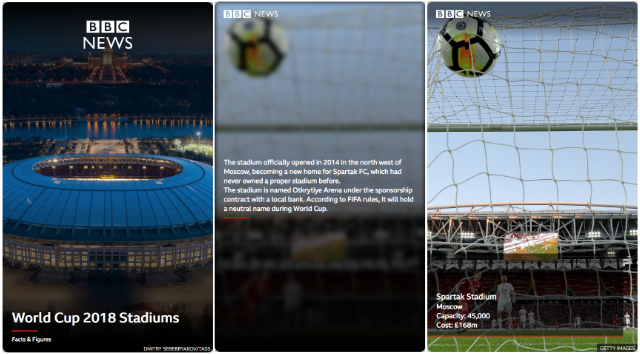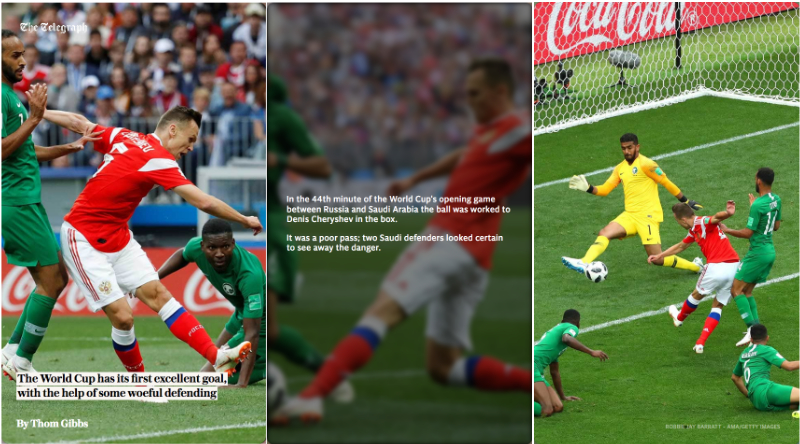Every publisher covering international, large-scale events will understand the challenges of getting their coverage to stand out online.
As the World Cup kicks off today (14 June), we expect to see some innovative projects from news organisations over the next month, which has been kicked off by experimentation from the BBC and The Telegraph.
Both publishers have been using Google AMP Stories, to enable them to instantly reach football fans with fast-loading, immersive content for mobile users.
Robert McKenzie, editor, BBC News Labs, explained that the World Cup is a great opportunity to experiment with the format as Stories provide a heavily visual experience. Collaborating with BBC Russian helped them to source some great pictures of the stadium – and the first World Cup AMP Story was born. The BBC has also published an AMP Story on Russia's World Cup Hopefuls, staring a handful of domestic players.
“We are still evaluating AMP Stories, so we aren’t in a position to have a firm view on the benefits versus the effort of adopting it as a permanent format for us," said McKenzie.
"It’s still only a trial from Google, so there aren’t any long-term guarantees.”
On Snapchat, Instagram and Facebook Stories, our work is constrained to users of those apps. Google AMP Stories is much more open and customisableJono Hutchison, The Telegraph
However, the BBC’s early research shows that users enjoy the simplicity of the experience, while the developers appreciate the relative simplicity of implementing it.
“We are going to carry on with our pilot to see how flexible it is for different story approaches.”
As it’s a pilot, the BBC had to build a very simple bespoke content management system (CMS) to allow journalists to create content without having to involve a developer at every stage of the process, explained McKenzie.
“The whole thing quickly becomes a bit chicken and egg: what do you want your CMS to do? It depends on what the most effective way to create the content is. But we can’t experiment with the content until we have a CMS.”
By bringing Oleg Mikhaylov, a BBC Russian senior journalist, into the team full-time, the BBC were able to crack that problem by having him create the content alongside the developers until they worked out the best way to organise the workflow.
“To our surprise, getting audiences to discover our AMP Stories content is one of the biggest challenges,” said McKenzie.
“Because this is a pilot from Google, it’s harder than we expected to get our stories to show up in Google searches and we are having conversations with them about how to overcome the problems we’ve encountered.”

Jono Hutchison, deputy head of social media at The Telegraph explained that Google AMP Stories gave them great flexibility across different mobile devices, tablets and on desktop.
"It's because they're built on the open web with responsive HTML," he said.
"On Snapchat, Instagram and Facebook Stories, our work is constrained to users of those apps. Google AMP Stories is much more open and customisable.”
The Telegraph published their first World Cup AMP Story on Thursday 14 June after the Russia vs. Saudi Arabia match. However, Hutchison's team already produced a successful AMP story in May, which was a feature piece from Mosul by Sam Tarling and Josie Ensor.

But just like at the BBC, experimenting with this new feature isn’t without hurdles. One of the challenges is keeping up with updates to the documentation and considering how it will affect the workflow.
And because there is no real CMS for creating these stories, The Telegraph also have to do the HTML and CSS themselves.
“It's not really a problem but it isn't at the stage yet where we can roll it out to journalists across the newsroom for them easily to create their own AMP Stories,” said Hutchison.
Either way, experimenting with Google AMP Stories won’t stop after the World Cup has ended. The BBC is already experimenting with offering their front pages via AMP Stories as a series of cards, both in English and Russian.
“It’s rather against the spirit of the AMP Stories experience,” conceded McKenzie, “but we really like them. However, the audience seems rather more undecided, so don’t hold your breath for this being anything more than some News Labs experimentation."
Free daily newsletter
If you like our news and feature articles, you can sign up to receive our free daily (Mon-Fri) email newsletter (mobile friendly).
Related articles
- Reporting LGBTQ+ stories from Qatar, with sports journalist Michael McCann
- After threatening its very existence, covid-19 gave local sports reporting a whole new meaning
- Fever Pit'ch: a football newsletter powered by reader-first approach and strong community
- Coexistence, confrontation or collaboration? Defining the relationship between publishers and platforms
- The Equaliser's email strategy for football 'insights'










